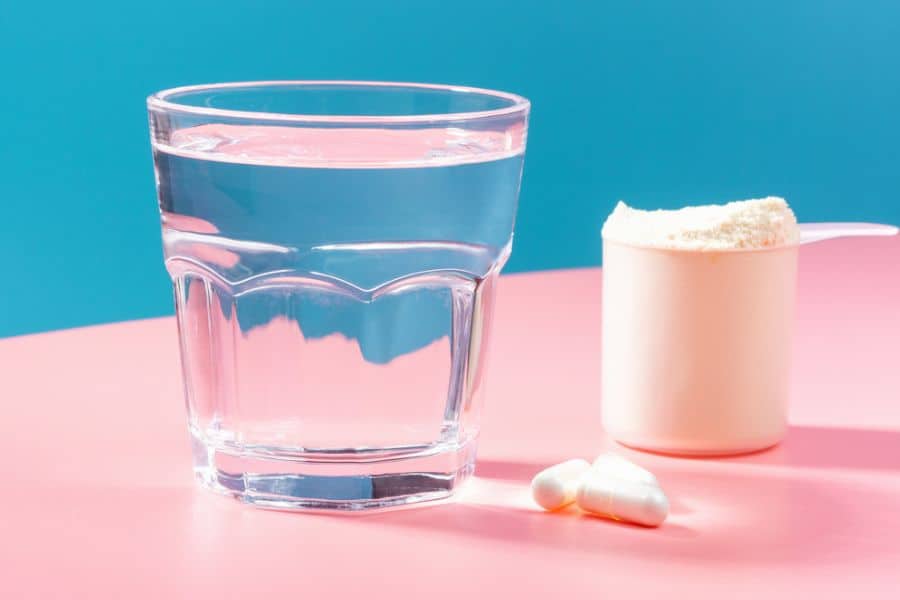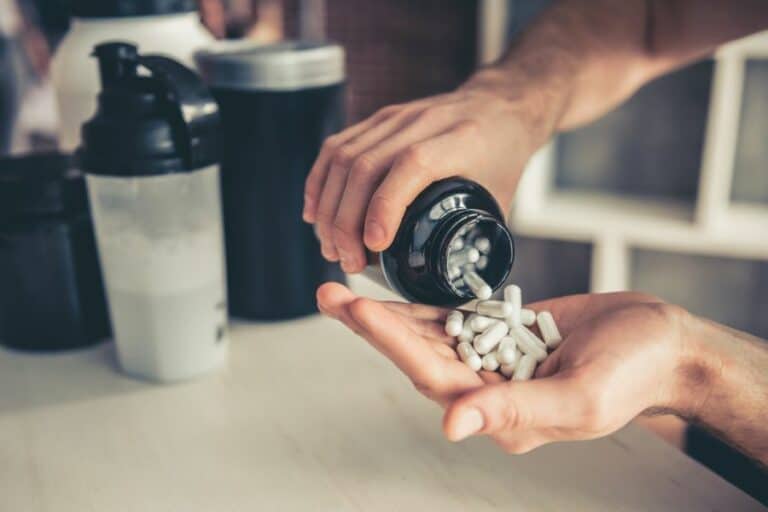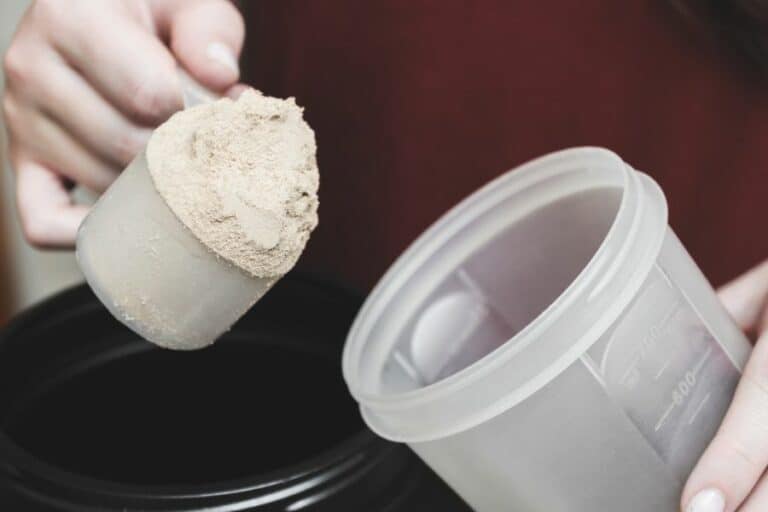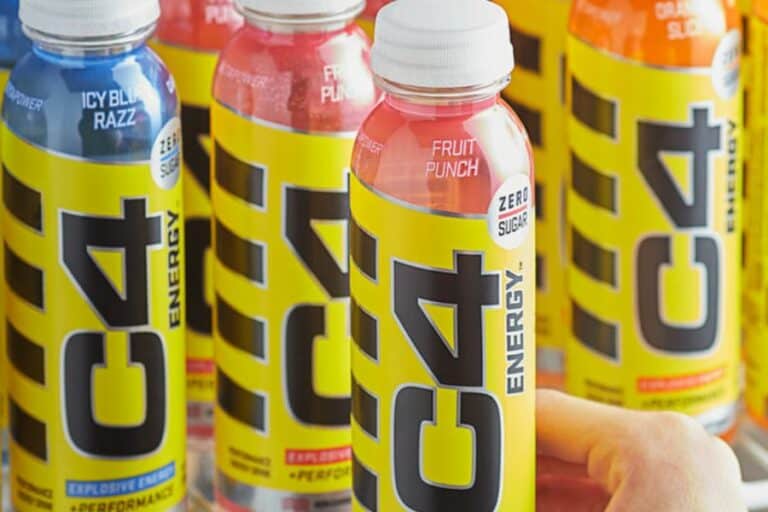How Much Water Should I Drink on Creatine? Hydration Guide

How Much Water | Water Intake Guidelines | Factors | Benefits | Risks | Tips
Creatine is a popular supplement used to improve athletic performance and increase muscle growth.
It is actually an amino acid found naturally in the body in limited amounts. However, it can be supplemented through diet to help increase muscle mass, strength, and athletic performance.
Fish and beef naturally contain sufficient creatine for the average person’s needs. Those with higher creatine needs can opt for store-bought pre-workout creatine supplements.
Creatine is generally considered safe when taken appropriately. Nevertheless, creatine may lead to bloating, weight gain, or even dehydration in some people. As such, it is important to understand how much water one should drink while taking creatine supplements.
How Much Water Should I Drink on Creatine?
Creatine intake can increase muscle water content and may cause dehydration if adequate water intake is not maintained.
To maintain optimal hydration while taking creatine, it is recommended to consume at least 3 to 5 liters (1-1.5 gallons) of water per day.
Sufficient hydration helps optimize the benefits of creatine and supports overall health and performance.
Understanding Creatine
Creatine is a naturally occurring organic compound found in the body in the form of creatine phosphate. It plays an important role in energy production.
Creatine assists in the generation of adenosine triphosphate (ATP), a molecule that supplies cells with vital energy for muscle contraction and other body functions. It plays a crucial role in supplying energy to muscles during intense physical activity.
Many athletes and bodybuilders need more creatine than what is synthesized by the body, and they may have to supplement their diet with pre-workout creatine supplements. They use supplements like creatine monohydrate to increase muscle mass, strength, and performance.
Water and Creatine
Creatine-based water retention is linked to its intracellular osmosis-inducing properties. This refers to the process by which creatine supplementation results in an increase in the concentration of solutes, such as creatine phosphate, inside muscle cells. This draws water into the cells, resulting in increased cell hydration and volume.
The higher cellular hydration then leads to improved muscle contractility and strength. This process causes an increase in body mass and total body weight [1]National Library of Medicine: Creatine Supplementation Increases Total Body Water Without Altering Fluid Distribution.
It is important to remember that this process limits the total availability of the body’s water stores for all other bodily functions. Therefore, people who consume creatine need to make sure that they make up for this by increasing their water intake.
Water Intake Guidelines for Creatine Users
The National Academy of Medicine suggests [2]National Academies Press: Water Healthy men should aim for a daily fluid intake of around 13 cups, while healthy women should aim for around 9 cups. These amounts may be variable based on age, climate and physical activity levels.
As mentioned earlier, creatine consumption may result in water retention and dehydration in some users. As such, it is important to increase your daily water consumption.
To prevent dehydration, an individual must consume 3-5 liters (1-1.5 gallons) of water daily while using creatine. When taking a 3-5 gram serving of creatine, it’s essential to drink 300-500 ml of water per serving.
If you are still in the loading phase, add an extra 100 ml of water for every 1 gram of creatine consumed over the 5-gram mark.
Factors Influencing Water Intake on Creatine
Several factors can influence the recommended water intake while taking creatine supplements. The following are the 4 important factors that decide how much water to drink on creatine:
1. Creatine loading phase vs maintenance phase
During the initial phase of creatine supplementation, known as the loading phase, individuals typically consume a higher dose of creatine for a short period, typically around 5 to 7 days.
The purpose of this loading phase is to saturate the muscles with creatine quickly. During this phase, it is essential to increase water intake to support the increased creatine levels in the muscles.
A common loading protocol involves taking 20 grams of creatine per day, divided into four 5-gram servings. To support this higher creatine dosage, it is recommended to drink 6-8 fluid ounces of water with each serving during the loading phase.
Once the loading phase is complete, individuals move into the maintenance phase, where the dosage is reduced to a lower maintenance dose, typically around 3 to 5 grams of creatine per day.
During this phase, the water intake can be adjusted to a standard recommended level for creatine consumers, which is around 8 to 10 cups of water per day (64 to 80 ounces)
2. Activity level and exercise intensity
Individuals who engage in intense workouts or endurance exercises that cause significant sweating may need to increase their water intake to compensate for fluid loss.
Creatine supplements cause a large portion of the body’s water to get absorbed by muscle cells, leaving very little for the body’s thermal regulation processes.
Therefore, people who exercise intensely and for long periods may require more water to reduce the risk of dehydration.
3. Environmental factors
Given that intracellular water retention consumes so much of the body’s water stores, a process like sweating can become even more draining and dehydrating for people taking creatine supplements.
This is where environmental factors like humidity and temperature come into play. People living in humid or hot environments should keep in mind that they may need to consume more water than people living in cooler climates.
Benefits of creatine supplementation
Creatine supplementation has long been recognized for its numerous benefits in the world of fitness and athletics. It has now become a safe, go-to supplement for many, thanks to its ability to enhance performance and improve overall physical health.
Below are some of its most proven benefits:
1. Muscle protein synthesis
By increasing the availability of phosphocreatine in your muscles, creatine helps fuel the production of adenosine triphosphate (ATP), which is essential for muscle contractions. This increased energy supply enables the muscles to work harder, leading to greater protein synthesis and ultimately, muscle growth.
2. Increase in muscle mass
Creatine helps to promote the growth of healthy, fat-free muscle mass. It improves the composition of the muscles through a process known as volumization. This process increases the muscle cell’s capacity to absorb water and therefore, increases the size and strength of the muscles.
3. Increased explosive strength
In addition to muscle growth, creatine also contributes to increased explosive strength. This is particularly beneficial for athletes who engage in high-intensity, short-duration activities like sprinting or weightlifting. The extra boost in strength can help improve performance and lead to better results in training and competition.
4. Promotes muscle recovery
Creatine has been found to help reduce inflammation and muscle damage, allowing for quicker recovery and enabling athletes to maintain a more consistent and effective training schedule.
Adverse effects of creatine supplementation
It is worth noting that these adverse effects are relatively uncommon among creatine consumers. The majority of individuals who take creatine supplements experience no significant side effects.
Nonetheless, it is important to note the following adverse effects that may occur in some individuals when using high doses or not following proper usage guidelines:
1. Muscle cramps
Muscle cramps are the most common signs of dehydration. Creatine can cause muscle cramps in certain individuals, particularly if they are not adequately hydrated. Ensuring proper water intake and electrolyte balance can help mitigate this issue.
2. Water retention
Since creatine works in the body through the process of drawing water into muscle cells, many might experience a heightened rate of water retention in their body. This water retention is usually superficial and temporary and should not cause any serious health issues.
3. Stomach discomfort
Some individuals may experience stomach discomfort, in the form of bloating, gas, or indigestion when taking creatine supplements. This can often be alleviated by adjusting the dosage, using micronized creatine [3]Science Direct: Micronization of creatine monohydrate via Rapid Expansion of Supercritical Solution (RESS), or consuming the supplement with a meal.
4. Allergic reactions
Although rare, some people may have an allergic reaction to creatine, resulting in symptoms like digestive reactions, rashes, or difficulty breathing. If you suspect an allergic reaction, discontinue use immediately and consult a healthcare professional.
Tips for Staying Hydrated on Creatine
Here are a few more tips to increase your overall hydration levels during creatine consumption. These will ensure that you get the best out of your creatine supplements while avoiding any adverse effects.
- Drink more water throughout the day. Find out how much water you should drink in a day, and try to aim for at least 2-3 cups more than your daily recommended intake.
- Include water-rich foods in your diet, such as fruits, vegetables, broth, and soups. These will help to ensure that your body is well-hydrated.
- Use electrolyte-rich drinks to replenish your body’s water and electrolyte levels. This can help maintain proper hydration while exercising and taking creatine supplements.
- Monitor things like urine color, sweat rate, and body weight to gauge your hydration levels.
- Try to reduce the amount of caffeine or alcohol consumption during creatine supplementation. Both of these can act as diuretics, causing your body to lose more water than usual.
- Listen to your body’s thirst signals. Make sure that you drink enough water when your body tells you to.
Conclusion
Creatine is known to affect the body’s water levels, leading to dehydration. Therefore, it is important to understand how much water one should drink while taking creatine supplements.
Watch out for signs of both dehydration and overhydration while taking creatine. Seek the advice of a healthcare professional or sports nutritionist for personalized guidance on how much water to drink and how to supplement with creatine. Proper hydration while consuming a creatine supplement can help improve your athletic performance and overall health.
References
| ↑1 | National Library of Medicine: Creatine Supplementation Increases Total Body Water Without Altering Fluid Distribution |
|---|---|
| ↑2 | National Academies Press: Water |
| ↑3 | Science Direct: Micronization of creatine monohydrate via Rapid Expansion of Supercritical Solution (RESS) |







